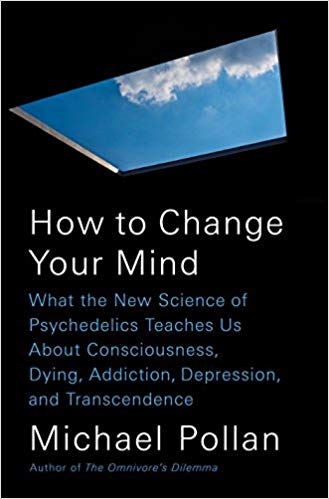Take a Dose of Michael Pollan’s Latest Batch,
How to Change Your Mind
– Book Review by Will Bahr – August 24, 2018 –
Penguin, 2018, $28.00 US, $37.00 CA
 Michael Pollan’s latest book is How to Change Your Mind: What the New Science of Psychedelics Teaches Us About Consciousness, Dying, Addiction, Depression and Transcendence. If the book’s title seems a mouthful, so are its contents a headful–it’s hard to recollect the book’s trip in entirety, some scenes losing their potency in acid-comedown-fashion. The comprehensive work covers the botanical and cultural history of psychedelics, their potential re-adoption by the medical world and their usage by individuals (namely himself). There is an immense amount of ground to cover, ground which Michael Pollan spends a significant amount of time under. The subject matter is, of course, illegal, and it’s exciting to watch this established, respectable author navigate the bootleg world. The book, however, transcends the hype of bad behavior, on which it certainly leans for eye candy but is by no means reliant.
Michael Pollan’s latest book is How to Change Your Mind: What the New Science of Psychedelics Teaches Us About Consciousness, Dying, Addiction, Depression and Transcendence. If the book’s title seems a mouthful, so are its contents a headful–it’s hard to recollect the book’s trip in entirety, some scenes losing their potency in acid-comedown-fashion. The comprehensive work covers the botanical and cultural history of psychedelics, their potential re-adoption by the medical world and their usage by individuals (namely himself). There is an immense amount of ground to cover, ground which Michael Pollan spends a significant amount of time under. The subject matter is, of course, illegal, and it’s exciting to watch this established, respectable author navigate the bootleg world. The book, however, transcends the hype of bad behavior, on which it certainly leans for eye candy but is by no means reliant.
Long-time acolytes of Pollan, who won their favor with the likes of The Botany of Desire (2001) and The Omnivore’s Dilemma (2006) will be familiar with his style. For my part, I’d remained straightedge, awaiting my first bout with him in anticipation like a kid in a smoke circle. I’d heard good things, and Pollan delivered. He carries the torch of New Journalism high, marrying his reporting style with a novelist’s imagery, conjuring sentences like, “you can almost hear in [Allen Ginsberg’s] words the 1960’s being born, the still-damp, Day-Glo chick cracking out of its shell” (p. 193). He also grapples with simplicity: describing the afterglow of his first psychedelic experience (LSD, at age 60), he writes, “all that day and well into the next, a high-pressure system of well-being dominated my psychological weather” (p. 254). Read: “I was happy.” This is glaring especially because of his musing, just a few pages earlier, on the import of the simplicity, platitudes (i.e. “love is everything”) and ineffability of the psychedelic drug experience (p. 251). As he puts it himself, “the mystical journey seems to offer a graduate education in the obvious” (p. 71). For all its verbosity, though, it was hard not to find something in Pollan’s prose that had me turning on and tuning in—both his research and writing impress, and frequently.
Of other struggles, Pollan is more conscious. Psychedelic drugs represent novel ground for the empirical journalist, and not just because he avoided them as a teen—the experience they provide, is, again, notoriously indescribable. The very stock-in-trade of an author, transcribing the world at large for their readership, is put at significant risk with this subject. Aware of this, Pollan rises to the challenge, summing it up thusly:
“my default perspective is that of the philosophical materialist, who believes that matter is the fundamental substance of the world and the physical laws it obeys should be able to explain everything that happens… That said, I’m also sensitive to the limitations of the scientific-materialist perspective and believe that nature (including the human mind) still holds deep mysteries toward which science can sometimes seem arrogant and unjustifiably dismissive” (p. 12).

Needless to say, for readers of both Pollan’s work and this review, similar doubts will arise. Psychedelics come with enough baggage to dismay any bellhop, and Pollan is sure to do his own unpacking. He demonstrates the normalcy of psychoactive drug use, naming the Inuit the sole “culture on earth… that doesn’t make use of certain plants to change the contents of the mind, whether as a matter of healing, habit, or spiritual practice” (p. 13). He stresses just how time-honored and effective the drugs’ therapeutic use is: “there [have] been more than a thousand scientific papers on psychedelic therapy before 1965, involving more than forty thousand research subjects” (p. 104). He argues that such drugs were heavily propagandized since the 1960s, their danger criminally overplayed: “psychedelics are far more frightening to people than they are dangerous… It is virtually impossible to die from an overdose of LSD or psilocybin… and neither drug is addictive” (p. 14). Such insights, provided as much for housekeeping as information, are a mere buzz of the high brought on by Pollan’s research—to spoil its revelations here would truly be a harshing of mellows.
It’s no spoiler, however, to mention psychedelia’s beneficiaries. There are those who find themselves mired in the title’s more clinical ailments (Depression, Addiction) and those in its more existential quandaries (confrontations with or aversions to Consciousness, Dying, Transcendence). These former ills have largely been failed or made worse by pharmaceuticals while the latter are deemed unworthy of help. The latter camp is comprised of seemingly healthy folks, which the psychedelic therapy community affirms it can heal in treatment dubbed “the betterment of well people.” Such intrinsically human problems as the fear of death, the limits of the ego and unity with nature are explored, and beautifully. And each camp, throughout psychedelic therapy’s long history, has seen profound success with a little help from their chemical friends.
How to Change Your Mind asks some big questions, and, as to be expected of interrogations of the cosmos, it doesn’t provide much in the way of answers. One thing is certain, however—while Michael Pollan doesn’t stagger from the book’s pages a fried-out, paranoid shell, nor rise from the ink an enlightened monk, his mind has changed. On grounds both chemical and habitual, his mental status quo was fundamentally challenged, and we’re right alongside him throughout the long, strange trip. Whatever your prior opinions about psychedelics, consciousness, life and death, How to Change Your Mind is all but guaranteed to change yours.
 About the Author
About the Author
Did you like this book review about Michael Pollan’s How to Change Your Mind? Then you might also like his last book review: A Superior Cancer: sam sax’s Madness Under Examination.
Discover the best 21 books about therapeutic writing.